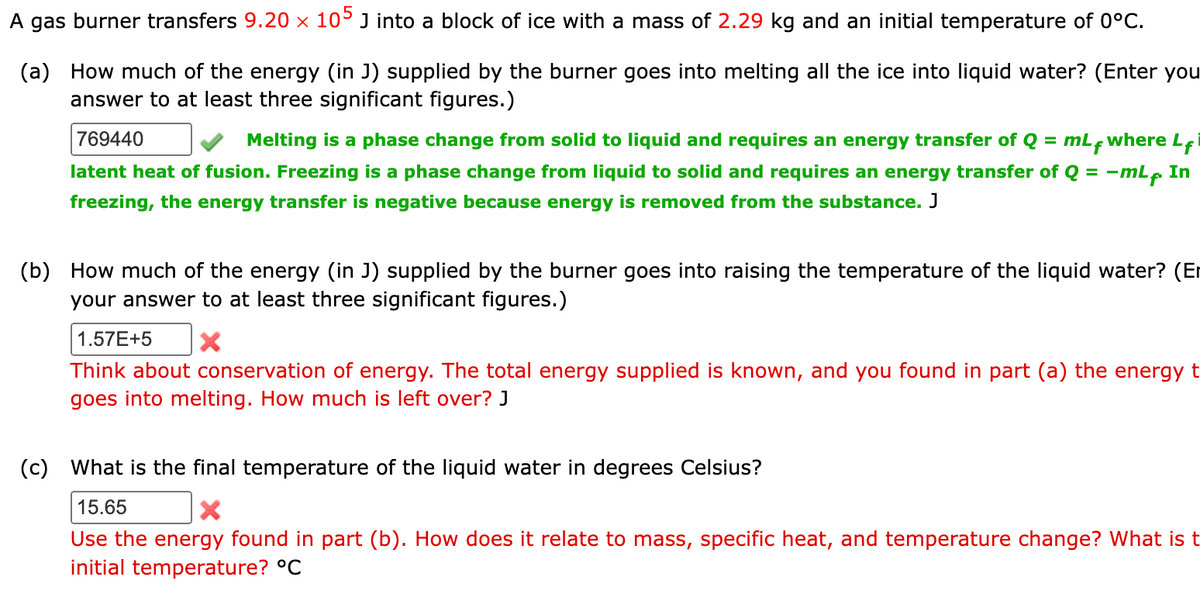A gas burner transfers 9.20 × 105 J into a block of ice with a mass of 2.29 kg and an initial temperature of 0°C. (a) How much of the energy (in J) supplied by the burner goes into melting all the ice into liquid water? (Enter you answer to at least three significant figures.) 769440 ✓ Melting is a phase change from solid to liquid and requires an energy transfer of Q = mL, where Lf latent heat of fusion. Freezing is a phase change from liquid to solid and requires an energy transfer of Q = -mLp In freezing, the energy transfer is negative because energy is removed from the substance. J (b) How much of the energy (in J) supplied by the burner goes into raising the temperature of the liquid water? (E your answer to at least three significant figures.) 1.57E+5 Think about conservation of energy. The total energy supplied is known, and you found in part (a) the energy goes into melting. How much is left over? J (c) What is the final temperature of the liquid water in degrees Celsius? 15.65 Use the energy found in part (b). How does it relate to mass, specific heat, and temperature change? What is initial temperature? °C
A gas burner transfers 9.20 × 105 J into a block of ice with a mass of 2.29 kg and an initial temperature of 0°C. (a) How much of the energy (in J) supplied by the burner goes into melting all the ice into liquid water? (Enter you answer to at least three significant figures.) 769440 ✓ Melting is a phase change from solid to liquid and requires an energy transfer of Q = mL, where Lf latent heat of fusion. Freezing is a phase change from liquid to solid and requires an energy transfer of Q = -mLp In freezing, the energy transfer is negative because energy is removed from the substance. J (b) How much of the energy (in J) supplied by the burner goes into raising the temperature of the liquid water? (E your answer to at least three significant figures.) 1.57E+5 Think about conservation of energy. The total energy supplied is known, and you found in part (a) the energy goes into melting. How much is left over? J (c) What is the final temperature of the liquid water in degrees Celsius? 15.65 Use the energy found in part (b). How does it relate to mass, specific heat, and temperature change? What is initial temperature? °C
Principles of Physics: A Calculus-Based Text
5th Edition
ISBN:9781133104261
Author:Raymond A. Serway, John W. Jewett
Publisher:Raymond A. Serway, John W. Jewett
Chapter17: Energy In Thermal Processes: The First Law Of Thermodynamics
Section: Chapter Questions
Problem 69P: An aluminum rod 0.500 m in length and with a cross-sectional area of 2.50 cm2 is inserted into a...
Related questions
Question

Transcribed Image Text:A gas burner transfers 9.20 × 105 J into a block of ice with a mass of 2.29 kg and an initial temperature of 0°C.
(a) How much of the energy (in J) supplied by the burner goes into melting all the ice into liquid water? (Enter you
answer to at least three significant figures.)
769440
Melting is a phase change from solid to liquid and requires an energy transfer of Q = mLf where Li
latent heat of fusion. Freezing is a phase change from liquid to solid and requires an energy transfer of Q = -mLf. In
freezing, the energy transfer is negative because energy is removed from the substance. J
(b) How much of the energy (in J) supplied by the burner goes into raising the temperature of the liquid water? (Er
your answer to at least three significant figures.)
1.57E+5 X
Think about conservation of energy. The total energy supplied is known, and you found in part (a) the energy t
goes into melting. How much is left over? J
(c) What is the final temperature of the liquid water in degrees Celsius?
15.65
X
Use the energy found in part (b). How does it relate to mass, specific heat, and temperature change? What is t
initial temperature? °C
Expert Solution
This question has been solved!
Explore an expertly crafted, step-by-step solution for a thorough understanding of key concepts.
This is a popular solution!
Trending now
This is a popular solution!
Step by step
Solved in 3 steps

Knowledge Booster
Learn more about
Need a deep-dive on the concept behind this application? Look no further. Learn more about this topic, physics and related others by exploring similar questions and additional content below.Recommended textbooks for you

Principles of Physics: A Calculus-Based Text
Physics
ISBN:
9781133104261
Author:
Raymond A. Serway, John W. Jewett
Publisher:
Cengage Learning

Physics for Scientists and Engineers: Foundations…
Physics
ISBN:
9781133939146
Author:
Katz, Debora M.
Publisher:
Cengage Learning


Principles of Physics: A Calculus-Based Text
Physics
ISBN:
9781133104261
Author:
Raymond A. Serway, John W. Jewett
Publisher:
Cengage Learning

Physics for Scientists and Engineers: Foundations…
Physics
ISBN:
9781133939146
Author:
Katz, Debora M.
Publisher:
Cengage Learning
